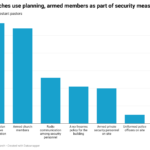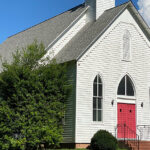
Here are three fears that can grow in a pastor’s heart during the Easter season and some ways to address them.
By Rob Hurtgen
Easter is the best time of year for pastors but it can also raise fear, anxiety, and stress levels.
For some pastors, planning for an Easter message creates an inner tension that’s different than what’s felt on a typical Sunday. What should be a time of celebration and victory gives way to fear and anxiety.
Here are three fears that can grow in a pastor’s heart during Easter and some ways to address them.
1. The fear of messing up.
On Easter Sunday, a church will hopefully have larger attendance than usual. The congregation attending will be made up of saints who need to be encouraged and challenged to live out their faith.
But pews will also seat “C.E.O.s”—those who only attend church on Christmas, Easter, and other occasions. Therefore, the message needs to communicate clearly to those who don’t value regular church attendance.
The pastor has a broad group of people to preach to on Easter Sunday. Instead of resting in the quiet confidence of the Holy Spirit, the pastor may become restless, listening to the voices of those saying, “Don’t blow it, preacher!”
The internal pressure to communicate the gospel in a clear way can be so high that the fear of messing up can either diminish our voice or keep us from speaking at all. We have a fear of messing up.
2. The fear of underdelivering.
Similar to the fear of messing up is the fear of underdelivering. We fear not giving our best message on what’s thought to be the most significant church event of the year.
I believe sermon prep and the act of preaching are the two responsibilities that occupy most of a pastor’s focus and energy during the week—regardless of the size of the congregation. With this being the case, pastors expect to do a great job with proclamation ministry—especially on an important day such as Easter.
Pastors should do a great job preaching, but possessing too high of an expectation of yourself can create a fear of not living up to your own expectations.
3. The fear of missing out.
I’ve been in a church where attendance swells on Easter because families gather together. But I’ve also been in the church where members leave on Easter to be with family members who’re scattered in different places.
I’ve served at churches where I didn’t have family close by. There’ve been several Easters and other special occasions when church families left for their family gatherings, and I and my unit went home alone.
The fear of missing out of special days and family gatherings can plague pastors and their family. This fear can give birth to envy, bitterness, and anger.
These three fears can grow within a pastor’s heart, but they don’t have to. Fears can be, by grace, cast out. Here are four ways to address these fears.
First, enlist a prayer team.
Paul writes to the Colossian church asking them to pray, “that God may open a door to us for the word, to speak the mystery of Christ, … so that I may make it known as I should” (Colossians 4:3–4).
Paul didn’t want to miss an opportunity to share the gospel. If Paul sought spiritual support, how much more do we need to do the same.
Enlist people in your church—perhaps even some people outside your church—who’ll commit to pray for you and your preaching ministry so that a door will be opened to share the gospel and that you’ll speak the mystery of Christ.
Second, realize that feeling afraid and nervous means whatever you’re doing is important to you.
If you’re nervous stepping into the pulpit, good. Your uneasiness reminds you of the tremendous weight of your responsibility and the importance both personally and eternally of the task the Lord has called you.
Allow your nervousness, fear, and anxiety to serve as prompts driving you to greater dependency upon the Father.
Third, combat the fear of loneliness by intentionally planning for your own family.
Your current ministry may not allow you to gather with your extended family on those special occasions, but that doesn’t mean you can’t have occasions that are special.
Create your own memories. Invite other families to be a part of your celebrations. Be intentional about how you celebrate.
Lastly, remember that fear is not of God.
“For God has not given us a spirit of fear, but one of power, love, and sound judgment” (2 Timothy 1:7). Fear tells us that something is going on around us, maybe even within us, that we need to notice.
But fear should never be given a place in our life where only the Lord belongs.
Fear, left unguarded, can derail your life and ministry. But fears surrendered to the Lord prompt greater dependency on Him.
Pastors, you can be afraid, but don’t live in fear.

Rob Hurtgen
Rob lives in Chillicothe, Mo., with his wife Shawn and their five kids. He’s the pastor of First Baptist Church. He also blogs at robhurtgen.wordpress.com.
After Easter: How Christ’s Resurrection Changed Everything
Jeremy Royal Howard & Doug Powell
FIND OUT MORE











